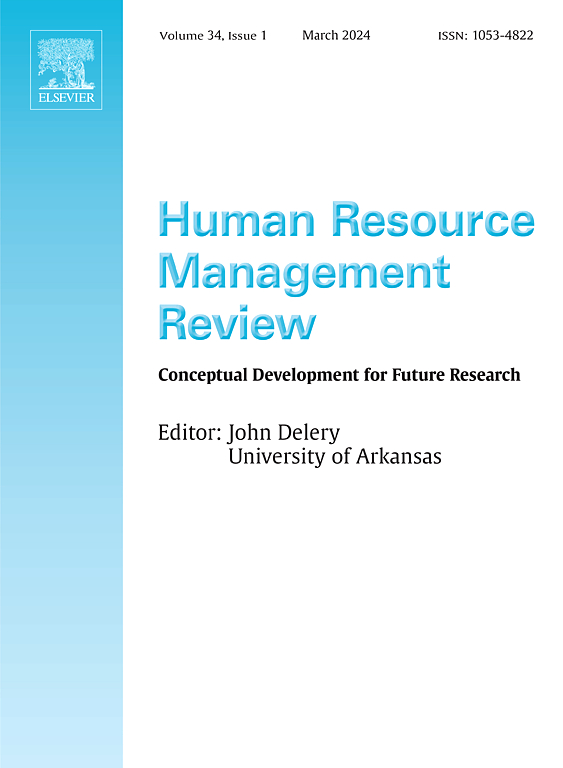Undervalued? Assessing the role pay systems play within the strategic HRM literature
IF 13
1区 管理学
Q1 MANAGEMENT
引用次数: 0
Abstract
Over the past 25 years, the strategic human resource management (HRM) literature has highlighted the relationship between integrated systems of HR practices and performance. Despite this growing body of research, the literature remains underdeveloped in offering precise guidance to practice on how best to align specific practices or sub-bundles with one another and the strategic objectives of the organization to optimize desired outcomes. Herein, we examine how the compensation sub-system has been theorized and measured in HR systems-level research. Our review indicates that compensation is commonly included in bundles of HR practices, but there is little consistency in the measures used and most studies use 3 or fewer items to assess the entire compensation system. Further, few interactive effects are addressed, and context is rarely considered when offering configurational HR system models. These oversights hinder theoretical development and practical guidance for the field and managers alike. Based on the issues identified in our review, we offer five recommendations for future researchers to carefully address the specific components and interactions related to compensation practices within the broader context of HR systems.
被低估?评估薪酬系统在战略人力资源管理文献中的作用
在过去的25年里,战略人力资源管理(HRM)文献强调了人力资源实践与绩效之间的关系。尽管有越来越多的研究,但是在如何最好地将特定的实践或子包与另一个和组织的战略目标结合起来以优化期望的结果方面,文献仍然没有提供精确的指导。本文将探讨薪酬子系统在人力资源系统层面的研究中是如何被理论化和测量的。我们的回顾表明,薪酬通常包含在人力资源实践的捆绑中,但所使用的测量方法几乎没有一致性,大多数研究使用3个或更少的项目来评估整个薪酬体系。此外,在提供配置人力资源系统模型时,很少考虑交互效应,并且很少考虑上下文。这些疏忽阻碍了理论发展和对领域和管理人员的实践指导。基于我们在回顾中发现的问题,我们为未来的研究人员提供了五个建议,以便在更广泛的人力资源系统背景下仔细解决与薪酬实践相关的具体组成部分和相互作用。
本文章由计算机程序翻译,如有差异,请以英文原文为准。
求助全文
约1分钟内获得全文
求助全文
来源期刊

Human Resource Management Review
MANAGEMENT-
CiteScore
20.20
自引率
7.00%
发文量
0
审稿时长
48 days
期刊介绍:
The Human Resource Management Review (HRMR) is a quarterly academic journal dedicated to publishing scholarly conceptual and theoretical articles in the field of human resource management and related disciplines such as industrial/organizational psychology, human capital, labor relations, and organizational behavior. HRMR encourages manuscripts that address micro-, macro-, or multi-level phenomena concerning the function and processes of human resource management. The journal publishes articles that offer fresh insights to inspire future theory development and empirical research. Critical evaluations of existing concepts, theories, models, and frameworks are also encouraged, as well as quantitative meta-analytical reviews that contribute to conceptual and theoretical understanding.
Subject areas appropriate for HRMR include (but are not limited to) Strategic Human Resource Management, International Human Resource Management, the nature and role of the human resource function in organizations, any specific Human Resource function or activity (e.g., Job Analysis, Job Design, Workforce Planning, Recruitment, Selection and Placement, Performance and Talent Management, Reward Systems, Training, Development, Careers, Safety and Health, Diversity, Fairness, Discrimination, Employment Law, Employee Relations, Labor Relations, Workforce Metrics, HR Analytics, HRM and Technology, Social issues and HRM, Separation and Retention), topics that influence or are influenced by human resource management activities (e.g., Climate, Culture, Change, Leadership and Power, Groups and Teams, Employee Attitudes and Behavior, Individual, team, and/or Organizational Performance), and HRM Research Methods.
 求助内容:
求助内容: 应助结果提醒方式:
应助结果提醒方式:


